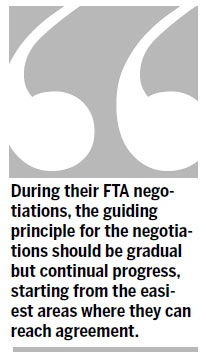Promoting regional trade
Updated: 2013-06-27 06:49
By Xu Changwen (China Daily)
|
|||||||||||

FTA between China and the ROK should be pushed forward as the first step toward broader East Asian cooperation
Among the planned free trade areas, the one between China, Japan and the Republic of Korea, three economic powerhouses of Asia, is definitely of key importance to the region. But to achieve that goal, each pair will have to establish a bilateral FTA first.
However, Japan's relations with both China and the ROK have worsened, after a number of its rightwing politicians made improper comments on territorial and historical problems, which has put a stop to its FTA negotiations with China and the ROK. Therefore, China and the ROK should accelerate the establishment of FTA between them.
After seven years of joint research, the two countries announced last year that they will finish negotiations within two years. Park Geun-hye's visit to China on Thursday will doubtlessly help promote not only the FTA process but also bilateral economic cooperation as a whole.
The concerns of both sides are now quite clear: The ROK fears that more competitive agricultural products from China might challenge its own, while China worries heavy chemical products from the ROK could have a negative influence on its domestic market.
These are unnecessary concerns. Actually, agricultural products accounted for only 4.6 percent of China's total exports to the ROK in 2012, while a large part of this was co-produced with grains and technology from the ROK.
Data from Japan's Ministry of Economy, Trade and Industry and the Export-Import Bank of Korea show that 32.2 percent of products of the ROK-invested enterprises in China are sold back to the ROK, much higher than the 18.2 percent of Japan.
For similar reasons China's concern is also unfounded. Having been open for over 30 years, China's heavy chemical industry is already quite developed, co-existing with huge investment from overseas, especially from the ROK. Besides, both countries realize the importance of cooperation and neither would try to influence the other's market.
Japanese research also shows that the ROK would benefit more from an FTA with China. A $27.8 billion increase in the ROK's exports of mechanical and electrical products is predicted, raising its GDP by 2.5 percent; besides, more opportunities will emerge from increased consumption and the opening of its services market. In marked contrast, Japan would lose $7 billion's worth of export opportunities to the two countries each year.
Japan should accelerate establishing an FTA with China, as it would increase its exports by $47.8 billion every year, according to the report.
Seoul must have noticed that cross-Straits economic relations between the Chinese mainland and Taiwan have been boosted since the signing of the Economic Cooperation Framework Agreement. The cross-Straits trade volume reached a historical high of $168.96 billion in 2012, while the first five months of this year saw a 43.4 percent increase in the mainland's imports from Taiwan, almost four times that of the ROK's 11.8 percent.
China's economic cooperation with the ROK has experienced tremendous progress since they established diplomatic relations in 1992. Their trade volume has grown 50 times in 20 years, reaching $256.3 billion in 2012. It took 27 years to achieve the same trade growth with the United States and 30 years with Japan. There were many reasons for this, and the initiative and research on establishing FTA being one.
An official report by the ROK shows that trade with China accounted for 20.3 percent of its total trade volume in 2011. And there has been a rising trend since 2000, and China's urbanization offers great potential for further cooperation.
However, despite the good momentum, the two countries still have much to do, like discussing greater cooperation in key industries and boosting the trade in services. In 2012, the service sector accounted for 44.6 percent of China's GDP, lower than developed countries and other emerging economies. The ROK enjoys advantages in such fields as finance, information services, insurance, which offers huge space for promoting cooperation.
Of course, during their FTA negotiations, the guiding principle for the negotiations should be gradual but continual progress, starting from the easiest areas where they can reach agreement, like partly cutting tariffs or signing trade agreements for goods, and excluding some products in sensitive industries.
Establishing an FTA between China and the ROK would also help promote the Regional Comprehensive Economic Partnership negotiations between the 10 members of ASEAN (Brunei, Cambodia, Indonesia, Laos, Malaysia, Myanmar, the Philippines, Singapore, Thailand, and Vietnam) and the six countries with which ASEAN has existing free trade agreements Australia, China, India, Japan, the ROK, and New Zealand, and thus boost the integration process of Asia.
The author is a researcher at the Chinese Academy of International Trade and Economic Cooperation, affiliated to the Ministry of Commerce.
(China Daily 06/27/2013 page8)
Today's Top News
Beijing looks to enhance ties with European nations
'Positive' sign on Asia-Pacific free trade pact
Venezuela eyed as Snowden's asylum
FM responds to Manila's accusations
Credit crunch hits smaller firms
Chinese firms eye strong EU brands
China faces long battle in drug crackdown
Sea center looking for candidates
Hot Topics
Lunar probe , China growth forecasts, Emission rules get tougher, China seen through 'colored lens', International board,
Editor's Picks

|

|

|

|

|

|





